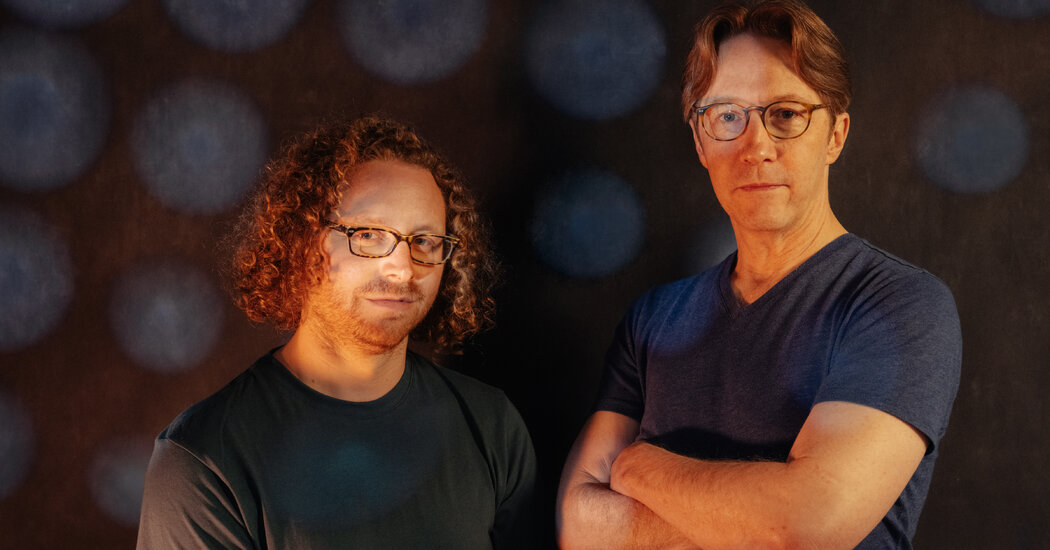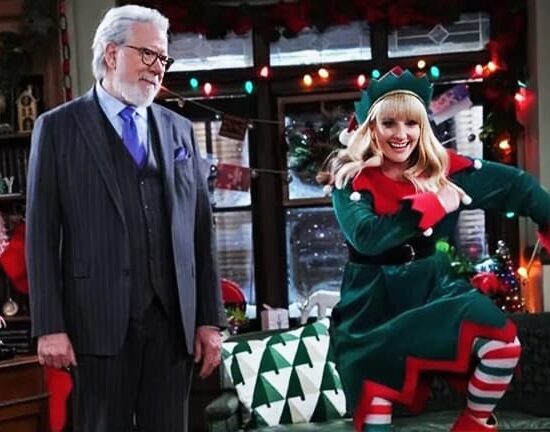
Years ago, when the composer Dylan Mattingly was at work on a new project, he wrote to his collaborator, Thomas Bartscherer, telling him, “I often find that *really* long is better than just long.”
Mattingly followed his own advice — and then some. “Stranger Love,” a singular, tender, euphoric, hypnotic opera that he and Bartscherer first envisioned 11 years ago, eventually grew to six hours, well past the point at which people start calling something impossible to produce.
“We went into it thinking it would never happen, because how could it?” Mattingly, 32, said in a recent interview.
Chunks of the piece have been performed in concert. But on Saturday — for the first time, and for one performance only — the whole thing will be staged at Walt Disney Concert Hall, the home of the Los Angeles Philharmonic, which has embraced “Stranger Love” as one of its trademark pie-in-the-sky presentations.
“Young, emerging artists who have big ideas deserve a place for that work to be seen,” said Chad Smith, the Philharmonic’s chief executive. “If the big institutions are not swinging for the rafters, why are we here?”
Directed by Lileana Blain-Cruz and played by Contemporaneous — the ensemble Mattingly founded as an undergraduate at Bard College with David Bloom, who will conduct — “Stranger Love” is not exactly Puccini, even if it does sketch a kind of love story. Largely abstract and intensely earnest, slowly telescoping into the cosmic sphere, it offers a heightened experience more than it does a concrete plot.
“The mood of the piece is something special,” said the composer John Adams, long a friend and mentor to Mattingly. “I believe the length of it is part of its spiritual — what can I say? — its spiritual impetus.”
“Stranger Love” recalls two other operas that sustain a time-suspending tone of meditative ecstasy for many hours, Philip Glass and Robert Wilson’s “Einstein on the Beach” and Olivier Messiaen’s “Saint François d’Assise.” Its sensibility was shaped by a CD Mattingly grew up with that featured the Tahitian Choir: “this glorious, polyphonic, joyous sound,” he said, “that’s moving around itself and congealing and drifting apart.” The early Minimalism of Glass is there, too, in the score’s vast expanses of shifting harmonies and repeating rhythms.
Three pianos, each tuned slightly differently, give a woozy, honky-tonk feel to some of the music, and sometimes offer a clangorous evocation of gamelan, a tie to the open-eared, pan-Pacific California spirit of Harry Partch and Lou Harrison.
There’s some of the lush overripeness of Messiaen’s “Turangalîla-Symphonie” and the billowing fragrance of Debussy. And echoes of the stylized approach to character and the deceptively simple, sometimes almost childlike sound world of Meredith Monk’s wordless opera “Atlas,” which Mattingly said he listened to every night (literally) for a year before he began “Stranger Love.”
His piece seems to float above the current-events themes of so much in new music. “It’s not telling you who to vote for or where to stand on an issue,” Bartscherer said, “but it’s asking that you imagine a world that could be otherwise.”
“I also think the dedication to joy is an interesting politics,” Blain-Cruz said. “The dedication to fighting for the beauty in life, for people to see that and appreciate it. Like, don’t kill our world; let’s see it in its splendor and see that it’s worth fighting for.”
Bartscherer’s spare text manages references to Anne Carson, Octavio Paz and Matthew Arnold, among others. A writer, translator and scholar, he was among Mattingly’s first professors at Bard, and quickly became a fan of Contemporaneous after its founding in 2010. Leaving one of the group’s concerts, Bartscherer had a vague idea for a piece of music theater: There would be two voices in love whose relationship develops, facing symbolic conflict from within and without, before resolving, all during a cycle of the four seasons.
He shared the notion with Mattingly, who had been composing since he was 6 but had been wanting to try writing vocal music. Passing material back and forth, they were soon off to the races; the two talk about “Stranger Love” almost as something that already existed complete, in some realm, needing to be discovered or channeled more than consciously created.
“It was there, somewhere,” Bartscherer said. “And Dylan’s antenna was hearing it somehow.”
At a certain point, they abandoned trying to corral the project into a traditionally manageable length, embracing the kind of epic world-building that Mattingly loved in “The Lord of the Rings” and “Battlestar Galactica.” On a 2014 visit to Point Reyes, on the California coast, Mattingly had a vision: The already sprawling score that he and Bartscherer had been working on was just Act I.
In this new conception, two more acts would follow, in which the voices would gradually drop out and the opera’s scope would expand to encompass, first, human lovers beyond the initial pair, and then the expanding universe.
It took years to finish, even given Mattingly’s single-minded focus. “Sometimes you have students, and you talk to them, and it takes two years to know that what you’re talking about got into their daily life,” said the composer David Lang, one of Mattingly’s teachers during graduate school at Yale. “But he made music so fluidly, and in such a dedicated fashion, that everything we were talking about immediately came out in the work.”
Mattingly and Bartscherer briefly thought about producing “Stranger Love” themselves, perhaps in an airplane hangar, but it was clear the cost would be prohibitive without an institutional partner. There were a lot of ignored emails from arts organizations; some who replied said that they couldn’t say yes without seeing it first.
A concert performance of the nearly four-hour first act, presented by Beth Morrison and the Prototype festival in 2018, proved the material’s viability — to its creators, at least. But it was only when Adams encouraged Smith of the Los Angeles Philharmonic to take a look at the score, and Mattingly began to send along recorded clips, that “Stranger Love,” long finished, was ex post facto commissioned by the Philharmonic for a staged production.
Blain-Cruz said that her staging aimed to be “both super simple and super grand,” with projections (designed by Hannah Wasileski) that evoke the natural world and beyond. Chris Emile’s choreography has been inspired by the cyclical movements of the planets and seasons.
“Chris as a choreographer is someone who’s tapped into — not lightly or glibly, but tapped into spirit,” Blain-Cruz said. “All of his physical work, it reaches levels of possession in some ways. Dylan mentions gospel music and spiritual music, riling people up to make themselves open. And I think the choreography matches that.”
Will “Stranger Love” have a life beyond Saturday? Mattingly has dreamed of doing it at the Park Avenue Armory in New York. But in the meantime, he and Bartscherer are already at work on another project. They claim that it will be shorter, but the title — “History of Life” — doesn’t give the sense that their scope has gotten any less ambitious.
“I did voice my concern,” Adams said, “that Dylan was creating a body of work that was always going to be a challenge to produce. And then I felt like a terrible old dad, like, ‘Are you going to get a job?’ He’s willing to just live an extremely modest life, absolutely devoted to his art.”













